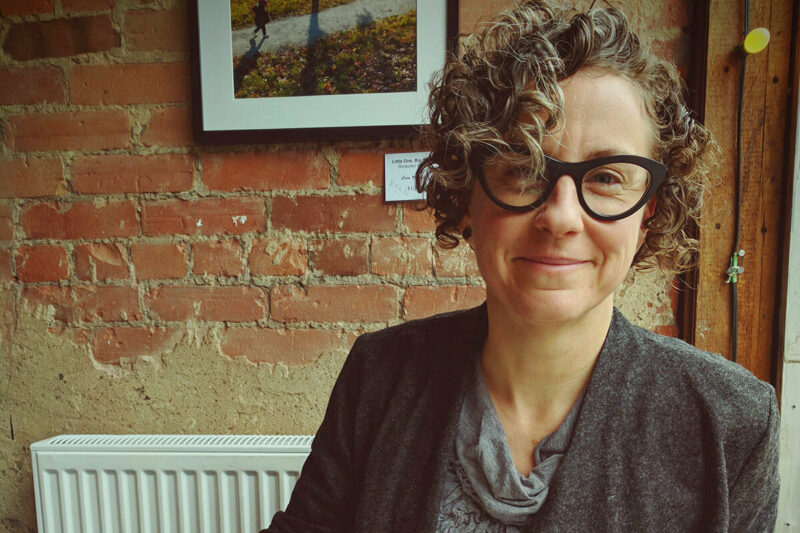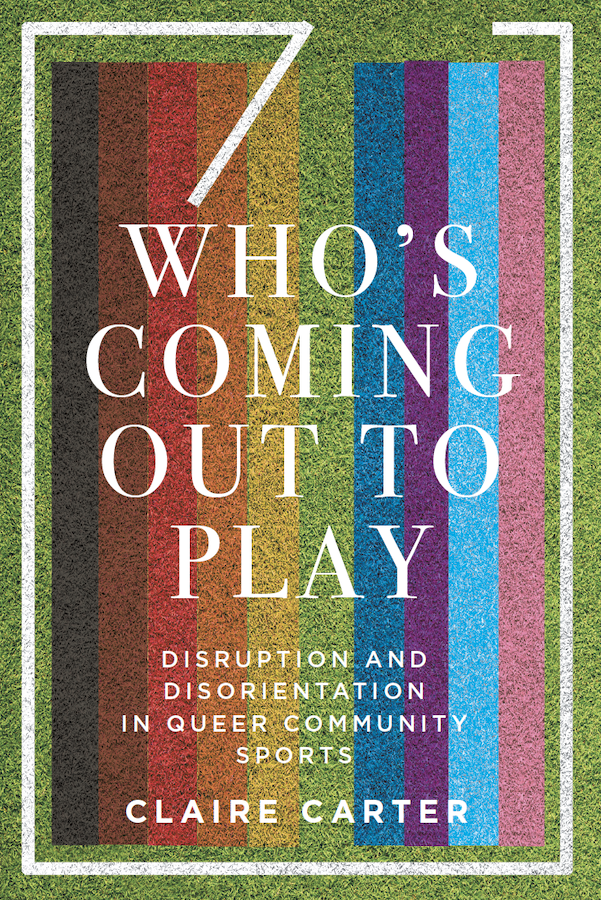Q&A with Claire Carter, URFA Equity Committee Chair
A foundation in student activism, positive connections with colleagues at the University of Regina, and an interest in learning more about how URFA works led Claire Carter to join URFA’s Equity Committee about eight years ago. The associate professor in the Department of Gender, Religion and Critical Studies is now in the third year of chairing URFA’s Equity Committee. Find out what’s been a highlight for her and learn about her teaching and research.
What interested you in becoming involved with URFA?
As a grad student, I was really lucky and proud to be part of a really socially justice activated and oriented union, CUPE 3903, at York University. Coming out of that framework, I was really interested in learning about the union. I was also very fortunate when I first landed at University of Regina that I started at the same time as two colleagues, Dr. Michelle Stewart and Dr. Michael Cappello. We initially applied for a small grant through the President’s Teaching and Learning Award to start up a small, anti-oppressive teaching project. That led to a fantastic network of colleagues who shared resources on anti-oppressive teaching and that informed knowing a bit more about the campus and about the different faculties and different activities. So, my entry point is both of those experiences. I feel very lucky for it.
What interested you in serving as the chair of the Equity Committee?
I’ve been on the equity committee for a long time and I had a great deal of respect for the chairs that had served before me. A colleague had said it was a really great experience for me to actually learn more about the union and actually have a better understanding of how the university works as well. And I’ve definitely found that to be the case.
Are there highlights for you of the Equity Committee’s work during your time on the committee?
The biggest thing is collegiality; the sense of deep commitment to these issues and creativity — like different ways of thinking about how do we want to address or respond to something and a deep respect for the fact that people were going to be coming from different places and there are different approaches to take. That richness of generosity that people have given saying, this is actually our committee’s expertise. We have such a range of expertise on the committee, so it’s wonderful that people will step up and be like, this is how I see it [and be really generous], to name an equity issue, and then work collaboratively on how to engage and respond to it.
What are you looking forward to about leading the Equity Committee over the next year?
The big thing would be that we have some new members and that’s always exciting because they bring new perspectives and the energy shifts. I’m excited about that and also getting to know people. In particular, we’re developing an action plan so we have concrete strategies on how we want to work as a committee. The goal is to be more proactive versus reactive, for example, on addressing anti-black racism, supporting integration of Indigenous ways of knowing and decolonization of the university, and the differential impact of COIVD-19 on our members (black, Indigenous, disabled, 2SLGBTQIAP+, contract/sessional members and care givers). Our hope is to better support members and to take action on issues that align with equity. Equity, diversity and inclusion is being talked about a lot. It’s been really important for us to take a step back and think about what does that mean to us as URFA members, but also for the equity committee that represents URFA. I’m excited to develop that, share it, and act on it. We need to start with advocating and addressing equity issues within URFA and then move outward, to focus on the university / campus more broadly.

Claire Carter, URFA Equity Committee Chair. Photo provided by Claire Carter.
Are there pieces you would like to highlight about what the Equity Committee does and why it’s an important committee to have?
We do two main things. One is that we support members that have equity-related issues. But also, if the Executive Committee or Council of Representatives has an issue, we provide support. One of the things we just did was pass two motions to share with the Executive Committee to help with recommending bargaining language that might be useful around promoting, addressing and integrating equity work on campus.
The other piece that we do is really raising awareness — being proactive in advocating on behalf of equity. What’s been so wonderful is that we have such a rich committee in terms of expertise. We have people that are well versed in anti-racist scholarship, queer theory, disability and a whole spectrum.
Shifting the focus of the conversation now to your work as an associate professor in the Department of Gender, Religion and Critical Studies — tell us a bit about what you teach and what your research is.
I feel really lucky; I teach some fantastic classes. I teach the Introduction to Women and Gender Studies class as well as a course on methodology — The Practice of Feminist Research. And I teach classes around queer theory — I have a fourth-year seminar on queer theory and trans studies on representation and embodiment. I also have a third-year seminar on pop culture, so race, gender and sexuality in pop culture, which is great. I also teach a Women and Health class that I’m revising to focus on women and gender diverse people and health.
I’m also a part of the University of Regina Queer Initiative and we are keeping our fingers crossed that in the next year or so we will have a minor in critical sexuality and gender studies.

The cover of Claire Carter’s book, “Who’s Coming Out to Play: Disruption and Disorientation in queer community sports”.
My recent research has been about queer community sports within Canada, focusing specifically on the two major cities that have a lot of leagues: Toronto and Vancouver. A lot of these leagues have shifted from being women or lesbian leagues to becoming trans and genderqueer inclusive. I talked with league organizers and players about what strategies they’ve deployed and what that looks like on the ground. This has been a really phenomenal experience; this work around a particular focus — trans inclusivity has also prompted inclusivity more broadly. So, looking at their racial diversity, looking at accessibility around people with disabilities, and how to make it a more inclusive space. It was really wonderful to bring together different leagues and talk about what has worked, offer suggestions and highlight how making an opening or shift here actually benefits everybody.
I’ve now shifted a little bit and I’m really excited to be partnering with two local organizations doing work in Treaty 4 in Regina. With Common Weal Community Arts and members of FadaDance Troupe, and trying to look at leisure community recreational programming that is specifically tied to trans and genderqueer people, first and foremost, but also to the queer community. There aren’t a lot of those spaces in general, never mind leisure spaces. The ability to have a space to move in, and be in, community and in your body in different ways is so important for community, but also for our health. We aim to bring trans and queer choreographers to Regina to offer community workshops and develop a community expertise in trans, genderqueer, and queer dance and movement programming.
What interested you in teaching, studying and researching in this area?
There was a personal connection. After my undergrad in human geography, I felt really compelled by stories of different people’s experiences in navigating and understanding social norms and the different ways that people felt empowered within their everyday spaces and practices. But also, many felt that social norms didn’t speak to their own experiences, to the extent that they felt excluded from many aspects of society, and that they were largely denied or seemingly invisible to those in dominant positions.
And I did a lot of reading of feminist texts about gender and sexuality and how they intersect with race, class and ability. How do different spaces — such as where we get our hair cut or play basketball, the words and language we use, the media we consume and engage with — inform our changing notions and relationships with gender, our bodies and each other? I’ve been really interested in people’s own stories about how they navigate social norms, how they make sense to them and how they speak back to them. I’m really interested in the arts so I like to learn about creative approaches to building, not only community, but also communities of resistance and trying to support that work. I think that’s what really drew me — I’ve really enjoyed reading theory and thinking about how people grab onto particular ideas and try to reimagine how we can be together in community, and do collaborative efforts to challenge this notion of what is ‘common sense,’ and who it’s based upon and serves.
We’re social beings. So, I like to explore the ways we’ve come to understand the different priorities, values and meanings that are made in context to ask ‘what is normative?’ We’re doing things that actually can be really limiting as well as really inspiring in terms of the expansiveness of humanity.
Do you have any advice for URFA members who are looking to get more involved in URFA?
A general recommendation for new URFA members is reach out to find out what your possible involvement could look like- what your interests are & the expertise you could bring. It is your union – we all make it stronger by being involved! I think it’s a really great opportunity to kind of learn again more about the union and the university, but also to get a bit of a community which can be really important, especially when you’re when you’re new.
Is there anything else that you’d like to share?
I feel really fortunate that I’ve learned a lot, and I feel like my colleagues are extremely generous, both on the Executive Committee and the Council of Representatives, but also in the Equity Committee specifically. It’s really a wonderful opportunity of sustained collegiality. We’re really fortunate to have some really great people in leadership positions and as well on the union committees.
This interview has been condensed and edited.
Would you like to join the Equity Committee?
If you are interested in representing equity-seeking groups, consider joining the Equity Committee! At the time of publishing, there are four vacancies. If you’d like to fill one of these spots, please contact the URFA office.
Enjoy reading Q&As with URFA members?
Read our previous Q&A with Yasser Morgan, URFA Vice-President (Academic).
